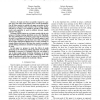Free Online Productivity Tools
i2Speak
i2Symbol
i2OCR
iTex2Img
iWeb2Print
iWeb2Shot
i2Type
iPdf2Split
iPdf2Merge
i2Bopomofo
i2Arabic
i2Style
i2Image
i2PDF
iLatex2Rtf
Sci2ools
WEBI
2010
Springer
2010
Springer
Lightweight Clustering Methods for Webspam Demotion
Abstract--To make sure they can quickly respond to a specific query, the main search engines have several mechanisms. One of them consists in ranking web pages according to their importance, regardless of the semantic of the web page. Indeed, relevance to a query is not enough to provide a high quality result, and popularity is used to arbitrate between equally relevant web pages. Webspam widely denotes any web page created with the only purpose of fooling ranking algorithms such as the PageRank. The aim of Webspam is to promote a target page by increasing its rank. It is an important issue for Web search engines to spot and discard Webspam to provide their users with a non biased list of results. Webspam techniques have to evolve constantly to remain efficient but most of the time they consist in creating a specific linking architecture around the target page to increase its rank. In this paper we propose to study the effects of graph clustering on the well known ranking algorithm of ...
Internet Technology | Page | Target Page | Web Page | WEBI 2010 |
| Added | 15 Feb 2011 |
| Updated | 15 Feb 2011 |
| Type | Journal |
| Year | 2010 |
| Where | WEBI |
| Authors | Thomas Largillier, Sylvain Peyronnet |
Comments (0)

